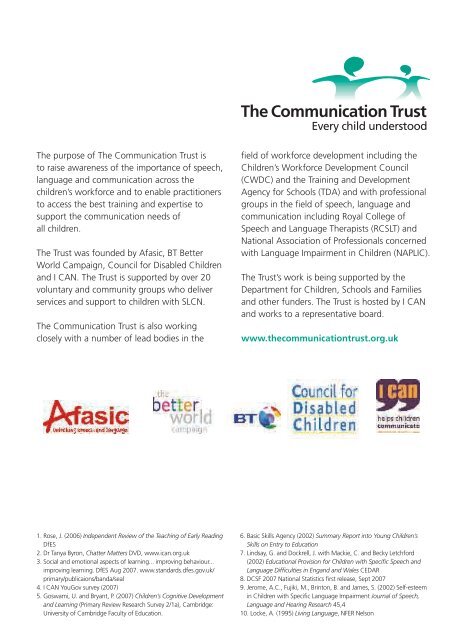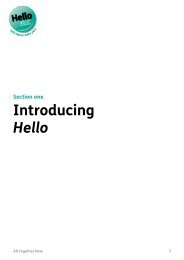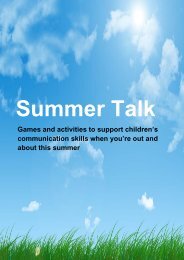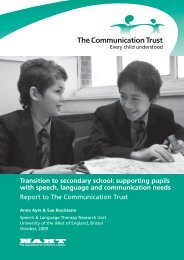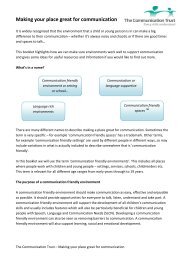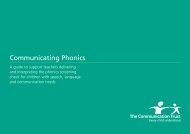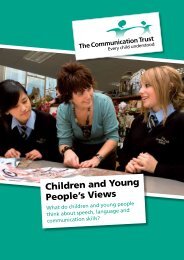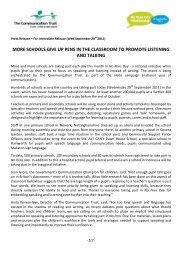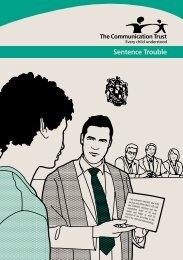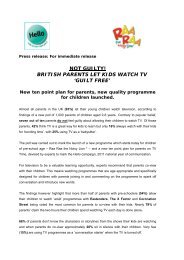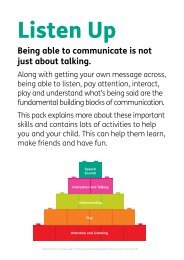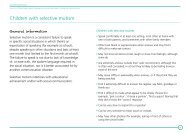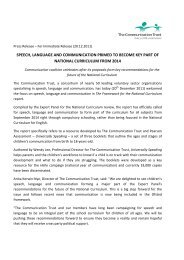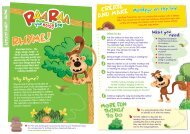Speech, language and communication - The Communication Trust
Speech, language and communication - The Communication Trust
Speech, language and communication - The Communication Trust
Create successful ePaper yourself
Turn your PDF publications into a flip-book with our unique Google optimized e-Paper software.
<strong>The</strong> purpose of <strong>The</strong> <strong>Communication</strong> <strong>Trust</strong> is<br />
to raise awareness of the importance of speech,<br />
<strong>language</strong> <strong>and</strong> <strong>communication</strong> across the<br />
children’s workforce <strong>and</strong> to enable practitioners<br />
to access the best training <strong>and</strong> expertise to<br />
support the <strong>communication</strong> needs of<br />
all children.<br />
<strong>The</strong> <strong>Trust</strong> was founded by Afasic, BT Better<br />
World Campaign, Council for Disabled Children<br />
<strong>and</strong> I CAN. <strong>The</strong> <strong>Trust</strong> is supported by over 20<br />
voluntary <strong>and</strong> community groups who deliver<br />
services <strong>and</strong> support to children with SLCN.<br />
<strong>The</strong> <strong>Communication</strong> <strong>Trust</strong> is also working<br />
closely with a number of lead bodies in the<br />
field of workforce development including the<br />
Children’s Workforce Development Council<br />
(CWDC) <strong>and</strong> the Training <strong>and</strong> Development<br />
Agency for Schools (TDA) <strong>and</strong> with professional<br />
groups in the field of speech, <strong>language</strong> <strong>and</strong><br />
<strong>communication</strong> including Royal College of<br />
<strong>Speech</strong> <strong>and</strong> Language <strong>The</strong>rapists (RCSLT) <strong>and</strong><br />
National Association of Professionals concerned<br />
with Language Impairment in Children (NAPLIC).<br />
<strong>The</strong> <strong>Trust</strong>’s work is being supported by the<br />
Department for Children, Schools <strong>and</strong> Families<br />
<strong>and</strong> other funders. <strong>The</strong> <strong>Trust</strong> is hosted by I CAN<br />
<strong>and</strong> works to a representative board.<br />
www.the<strong>communication</strong>trust.org.uk<br />
1. Rose, J. (2006) Independent Review of the Teaching of Early Reading<br />
DfES<br />
2. Dr Tanya Byron, Chatter Matters DVD, www.ican.org.uk<br />
3. Social <strong>and</strong> emotional aspects of learning... improving behaviour...<br />
improving learning. DfES Aug 2007. www.st<strong>and</strong>ards.dfes.gov.uk/<br />
primary/publicaions/b<strong>and</strong>a/seal<br />
4. I CAN YouGov survey (2007)<br />
5. Goswami, U. <strong>and</strong> Bryant, P. (2007) Children’s Cognitive Development<br />
<strong>and</strong> Learning (Primary Review Research Survey 2/1a), Cambridge:<br />
University of Cambridge Faculty of Education.<br />
6. Basic Skills Agency (2002) Summary Report into Young Children’s<br />
Skills on Entry to Education<br />
7. Lindsay, G. <strong>and</strong> Dockrell, J. with Mackie, C. <strong>and</strong> Becky Letchford<br />
(2002) Educational Provision for Children with Specific <strong>Speech</strong> <strong>and</strong><br />
Language Difficulties in Eng<strong>and</strong> <strong>and</strong> Wales CEDAR<br />
8. DCSF 2007 National Statistics first release, Sept 2007<br />
9. Jerome, A.C., Fujiki, M., Brinton, B. <strong>and</strong> James, S. (2002) Self-esteem<br />
in Children with Specific Language Impairment Journal of <strong>Speech</strong>,<br />
Language <strong>and</strong> Hearing Research 45,4<br />
10. Locke, A. (1995) Living Language, NFER Nelson


